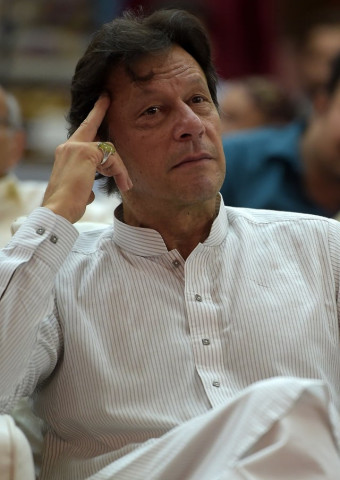Contradictions in implementing a vision
Internal political weakness will provide adversaries an opportunity to exert greater pressure

Prime Minister Imran Khan. PHOTO:AFP
But the flip side is that during elections and after assumption of office the type of vitriolic language that Imran Khan and his party members are using to target their opponents is anything but statesmanlike. Moreover, there are many policy positions and decisions Imran Khan and his party has taken in the 50 days of governance that belie this resolve. More worrisome is the politics of hate that is polarising our society with serious long-term consequences.
One can give the PTI party leaders some leeway for being novice in the art of governance although many of the ministers and advisers are experienced hands having served Musharraf’s regime and previous political governments of the PPP and the PML -N. Another disturbing feature is that in its enthusiasm to show quick results excessive spin is being given by government spokespersons and ministers on non-issues betraying lack of confidence and maturity.
Anyone with even a limited understanding of how governments function would not expect overnight change or their leaders to achieve miracles. So why undermine the government’s and the party’s credibility? This is also to point out the serious shortcomings in the present decision-making process. A classic example of this flip-flop was evident when it was hastily announced that Saudi Arabia would be a member of CPEC and then quickly retracting caused embarrassment to our strategic ally China and our Foreign Office. Similarly, confusion was galore when the policy regarding non-filers was changing every second day giving an impression that the government had not factored in all relevant aspects while formulating the tax policy.
Moreover, it is difficult to overlook that corruption cases are being initiated by NAB against Opposition leaders, especially when by-elections to national and provincial assemblies are only weeks or days away. This does not inspire confidence either in the investigating agencies or the government. It has raised doubts and lay bare that Pakistani institutions are more adept at creating problems than solving them. Even if granted that there is no malice and the law is taking its normal course, still it would have been more appropriate to wait till the elections were over. With our political history of 70 years full of intrigues, collusions and power play by state institutions it is only natural that people will suspect malevolence and targeted manipulation.
Indeed, no one is above the law and should be dealt with indiscriminately, but its implementation and presentation is equally important. Certain norms and ethics in pursuing offenders of justice have to be maintained to give dignity and creditability to our accountability organisations.
Arresting Shehbaz Sharif, the leader of Opposition, who has been chief minister of Punjab for two terms of the largest province in terms of population and resources, being treated so shabbily raises serious concerns. The Shehbaz spectacle, accompanied by accusations and counter-accusations, repeatedly shown on the national television has further inflamed political rivalries. After the NAB court’s decision, scores of protestors were seen breaking police barricades and staging passionate protests. The gridlock could shift the focus away from dispensing justice to political harassment thus weakening the credibility of our accountability institutions.
This is not to deny that accountability and drive against corruption is crucial if Pakistan is to move forward and become a proud and self-sustaining nation. The hard reality is that corruption runs deep and practically every institution, including the political class, is equally affected by it. To achieve the goal of reducing corruption would be a major endeavour spread over years. And it should not only be one sided and targeted against opponents. This approach has been tried several times and failed. Ideally, success in reducing corruption is possible if accountability institutions are manned by staff that stays above political favouritism, has high level of integrity and is professionally competent.
There are major challenges the country is facing that require greater harmony and united resolve. Without a broad national consensus on foreign policy that leads to a relatively amiable external environment domestic policies will be hard to implement. India seems determined at exerting maximum pressure by not even agreeing to engage at any level. Relations with the US are in a flux with serious reservations about each other’s Afghan policies. The situation in Afghanistan remains chaotic and unpredictable. In an unfavourable regional scenario that is unlikely to change in the near future a more unified response by the political parties would be necessary. Otherwise internal political weakness will provide adversaries an opportunity to exert greater pressure.
Another worrisome aspect is with increasing malice and political polarisation our emaciated democracy will get weaker with state institutions getting more powerful and intrusive. We are already witnessing this trend. Our political leadership in power can only overlook these hard realities for short-term gains whereas these could have long-term consequences.
Nations have progressed and societies have achieved stability when leaders have tried to heal wounds along with enforcing the rule of law. This has not happened in Pakistan. Successive governments, including the present one, have not realised that merely launching tirades against opponents or putting them behind bars and initiating legal cases may satisfy their vendetta but sooner than later come to haunt them.
Published in The Express Tribune, October 10th, 2018.
Like Opinion & Editorial on Facebook, follow @ETOpEd on Twitter to receive all updates on all our daily pieces.
















COMMENTS
Comments are moderated and generally will be posted if they are on-topic and not abusive.
For more information, please see our Comments FAQ